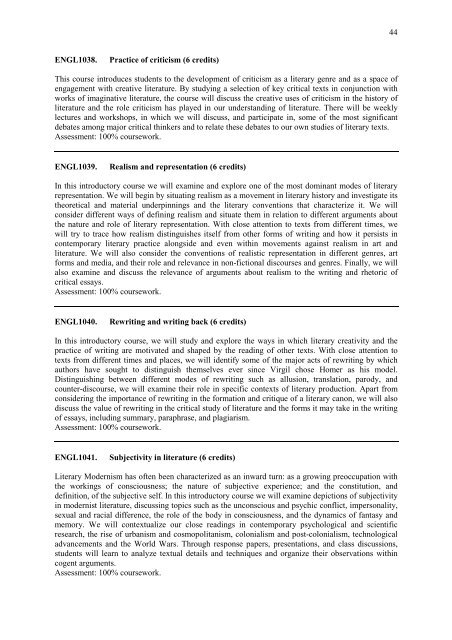(BA) (4-year-programme) - The University of Hong Kong
(BA) (4-year-programme) - The University of Hong Kong
(BA) (4-year-programme) - The University of Hong Kong
Create successful ePaper yourself
Turn your PDF publications into a flip-book with our unique Google optimized e-Paper software.
44ENGL1038.Practice <strong>of</strong> criticism (6 credits)This course introduces students to the development <strong>of</strong> criticism as a literary genre and as a space <strong>of</strong>engagement with creative literature. By studying a selection <strong>of</strong> key critical texts in conjunction withworks <strong>of</strong> imaginative literature, the course will discuss the creative uses <strong>of</strong> criticism in the history <strong>of</strong>literature and the role criticism has played in our understanding <strong>of</strong> literature. <strong>The</strong>re will be weeklylectures and workshops, in which we will discuss, and participate in, some <strong>of</strong> the most significantdebates among major critical thinkers and to relate these debates to our own studies <strong>of</strong> literary texts.Assessment: 100% coursework.ENGL1039.Realism and representation (6 credits)In this introductory course we will examine and explore one <strong>of</strong> the most dominant modes <strong>of</strong> literaryrepresentation. We will begin by situating realism as a movement in literary history and investigate itstheoretical and material underpinnings and the literary conventions that characterize it. We willconsider different ways <strong>of</strong> defining realism and situate them in relation to different arguments aboutthe nature and role <strong>of</strong> literary representation. With close attention to texts from different times, wewill try to trace how realism distinguishes itself from other forms <strong>of</strong> writing and how it persists incontemporary literary practice alongside and even within movements against realism in art andliterature. We will also consider the conventions <strong>of</strong> realistic representation in different genres, artforms and media, and their role and relevance in non-fictional discourses and genres. Finally, we willalso examine and discuss the relevance <strong>of</strong> arguments about realism to the writing and rhetoric <strong>of</strong>critical essays.Assessment: 100% coursework.ENGL1040.Rewriting and writing back (6 credits)In this introductory course, we will study and explore the ways in which literary creativity and thepractice <strong>of</strong> writing are motivated and shaped by the reading <strong>of</strong> other texts. With close attention totexts from different times and places, we will identify some <strong>of</strong> the major acts <strong>of</strong> rewriting by whichauthors have sought to distinguish themselves ever since Virgil chose Homer as his model.Distinguishing between different modes <strong>of</strong> rewriting such as allusion, translation, parody, andcounter-discourse, we will examine their role in specific contexts <strong>of</strong> literary production. Apart fromconsidering the importance <strong>of</strong> rewriting in the formation and critique <strong>of</strong> a literary canon, we will alsodiscuss the value <strong>of</strong> rewriting in the critical study <strong>of</strong> literature and the forms it may take in the writing<strong>of</strong> essays, including summary, paraphrase, and plagiarism.Assessment: 100% coursework.ENGL1041.Subjectivity in literature (6 credits)Literary Modernism has <strong>of</strong>ten been characterized as an inward turn: as a growing preoccupation withthe workings <strong>of</strong> consciousness; the nature <strong>of</strong> subjective experience; and the constitution, anddefinition, <strong>of</strong> the subjective self. In this introductory course we will examine depictions <strong>of</strong> subjectivityin modernist literature, discussing topics such as the unconscious and psychic conflict, impersonality,sexual and racial difference, the role <strong>of</strong> the body in consciousness, and the dynamics <strong>of</strong> fantasy andmemory. We will contextualize our close readings in contemporary psychological and scientificresearch, the rise <strong>of</strong> urbanism and cosmopolitanism, colonialism and post-colonialism, technologicaladvancements and the World Wars. Through response papers, presentations, and class discussions,students will learn to analyze textual details and techniques and organize their observations withincogent arguments.Assessment: 100% coursework.
















